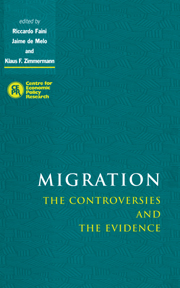Book contents
- Frontmatter
- Contents
- List of figures
- List of tables
- Foreword
- Acknowledgements
- List of conference participants
- 1 Trade and migration: an introduction
- PART ONE INSIGHTS FROM THEORY
- 2 Trade liberalisation and factor mobility: an overview
- Discussion
- 3 Regional integration, trade and migration: are demand linkages relevant in Europe?
- Discussion
- 4 Beyond international factor movements: cultural preferences, endogenous policies and the migration of people: an overview
- Discussion
- 5 Trade liberalisation and public-good provision: migration-promoting or migration-deterring?
- Discussion
- PART TWO QUANTIFYING THE LINKS BETWEEN TRADE AND MIGRATION
- PART THREE HISTORICAL AND CONTEMPORARY EVIDENCE
- Index
Discussion
from PART ONE - INSIGHTS FROM THEORY
Published online by Cambridge University Press: 10 May 2010
- Frontmatter
- Contents
- List of figures
- List of tables
- Foreword
- Acknowledgements
- List of conference participants
- 1 Trade and migration: an introduction
- PART ONE INSIGHTS FROM THEORY
- 2 Trade liberalisation and factor mobility: an overview
- Discussion
- 3 Regional integration, trade and migration: are demand linkages relevant in Europe?
- Discussion
- 4 Beyond international factor movements: cultural preferences, endogenous policies and the migration of people: an overview
- Discussion
- 5 Trade liberalisation and public-good provision: migration-promoting or migration-deterring?
- Discussion
- PART TWO QUANTIFYING THE LINKS BETWEEN TRADE AND MIGRATION
- PART THREE HISTORICAL AND CONTEMPORARY EVIDENCE
- Index
Summary
Introduction
In their chapter 3, Ludema and Wooton (hereafter, LW) integrate Krugman's (1991) model by considering an imperfectly elastic supply of labour with respect to international differences in real wages. Thus, they get a larger set of possible outcomes, some of which throw useful insights on the question of the preferred sequence between liberalisation of trade in goods, or of labour movements, as the process of international economic integration proceeds. I shall concentrate my comments on two main issues, and briefly mention a few other points.
The first issue: stable and unstable equilibria
The number of possible outcomes identified by LW is incomplete. In order to see it, notice that the demand for labour in Krugman's model, and the supply of labour in LW's model, are both non- linear in the (f, ω) space; while their analytical expression is not easily derived, numerical simulations suggest that they may present at least one point of inflection. Moreover, the demand function is not monotonic in τ. It is negatively-sloped for high transport costs (i.e. for a low value of τ), it gets positively-sloped as transport costs are reduced (i.e. for a high value of τ), but it flattens as they tend to zero (i.e. as t tends to unity). As for the supply function, it is positivelysloped but, in LW's example, it gets flatter as labour becomes internationally more mobile (i.e. as α = β tend to infinity).
Consider first the case analysed by Krugman (i.e. when the supply of labour function is horizontal – when α = β tend to infinity in LW's model).
Information
- Type
- Chapter
- Information
- MigrationThe Controversies and the Evidence, pp. 68 - 75Publisher: Cambridge University PressPrint publication year: 1999
